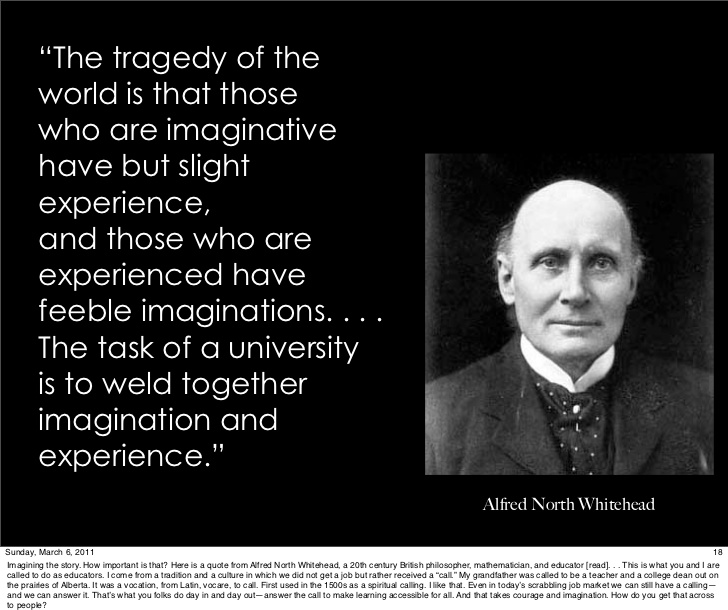

.jpg)
In physics particularly, Whitehead's thought has been influential, articulating a rival doctrine to Albert Einstein's general relativity.

In recent years, Whiteheadian thought has become a stimulating influence in scientific research. However, it was not until the 1970s and 1980s that Whitehead's thought drew much attention outside of a small group of American philosophers and theologians, and even today he is not considered especially influential outside of relatively specialized circles. Isabelle Stengers wrote that "Whiteheadians are recruited among both philosophers and theologians, and the palette has been enriched by practitioners from the most diverse horizons, from ecology to feminism, practices that unite political struggle and spirituality with the sciences of education." Indeed, in recent decades attention to Whitehead's work has become more widespread, with interest extending to intellectuals in Europe and China, and coming from such diverse fields as ecology, physics, biology, education, economics, and psychology. Whitehead's process philosophy argues that "there is urgency in coming to see the world as a web of interrelated processes of which we are integral parts, so that all of our choices and actions have consequences for the world around us." For this reason, one of the most promising applications of Whitehead's thought in recent years has been in the area of ecological civilization and environmental ethics pioneered by John B. Today Whitehead's philosophical works – particularly Process and Reality – are regarded as the foundational texts of process philosophy. Whitehead argued that reality was fundamentally constructed by events rather than substances, and that these events cannot be defined apart from their relations to other events, thus rejecting the theory of independently existing substances. He developed a comprehensive metaphysical system which radically departed from most of western philosophy. Principia Mathematica is considered one of the twentieth century's most important works in mathematical logic, and placed 23rd in a list of the top 100 English-language nonfiction books of the twentieth century by Modern Library.īeginning in the late 1910s and early 1920s, Whitehead gradually turned his attention from mathematics to philosophy of science, and finally to metaphysics. His most notable work in these fields is the three-volume Principia Mathematica (1910–13), which he co-wrote with former student Bertrand Russell. In his early career Whitehead wrote primarily on mathematics, logic, and physics. He is best known as the defining figure of the philosophical school known as process philosophy, which today has found application to a wide variety of disciplines, including ecology, theology, education, physics, biology, economics, and psychology, among other areas. Photographs of the philosopher, his family, and associates provide an intimate look at a private and self-effacing man whose work has had a lasting impact on twentieth-century thought.Alfred North Whitehead, OM FRS (15 February 1861 – 30 December 1947) was an English mathematician and philosopher. Never before published, the letters add a new personal dimension to Whitehead's life and thought. Although Whitehead ordered that all his private papers be destroyed, Lowe was given access to letters the philosopher wrote to his son, North, and others. Discussing these and other important works, Lowe combines scholarly analysis with valuable insights gathered from Whitehead's friends and colleagues. Science and the Modern World appeared in 1925, Religion in the Making in 1926, Symbolism in 1927, and Process and Reality in 1929. Although Whitehead wrote philosophy based on natural science while still in London, he began his most important work shortly after moving to Harvard in 1924. Volume 2 of Alf red North Whitehead: The Man and His Work follows Whitehead's journey to the United States and analyzes his expanding intellectual life. The intellectual and personal restlessness that precipitated this move ultimately led Whitehead-at the age of sixty-three-to settle in America and change the focus of his work from mathematics to philosophy. In 1910 Whitehead abruptly ended his thirty-year association with Trinity College of Cambridge and moved to London. The second volume of Victor Lowe's definitive work on Alfred North Whitehead completes the biography of one of the twentieth century's most influential yet least understood philosophers.


 0 kommentar(er)
0 kommentar(er)
